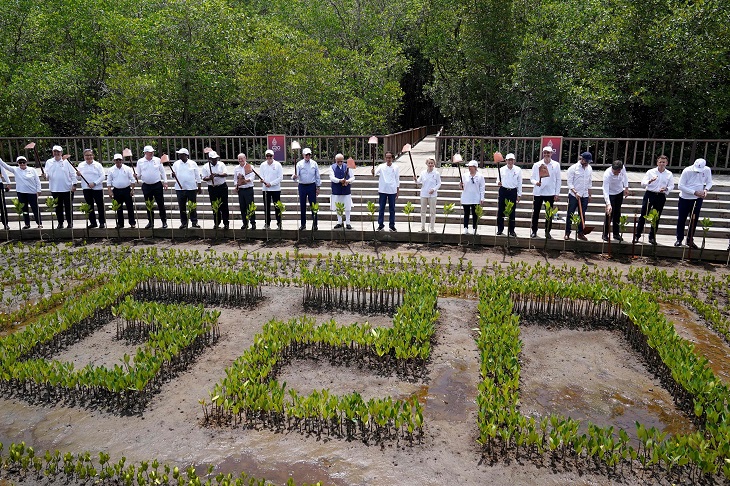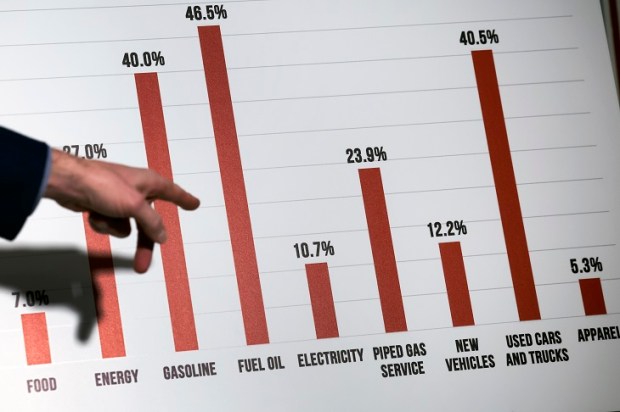Hydrocarbons are ‘part of the miracle of modernity’ and replacing them is an enormous challenge. But this challenge has to be undertaken and undertaken ‘worldwide’.
Or so said Bill Gates, Microsoft founder and a major philanthropist, speaking in Sydney to the Lowy Institute on January 23.
Why act on climate change? Because it is a problem that ‘will become worse and worse over time’ with potentially frightening effects for the world.
Mr Gates’ call for drastic action on hydrocarbons may be justified if the world can be sure that climate change ‘will become worse and worse’.
But it is not justified if there are uncertainties about the science behind this view. And there are such uncertainties.
The first uncertainty is that the link between greenhouse gas emissions and global warming is yet to be determined with any precision.
If it was, it would be possible to forecast future warming. But such attempts have so far failed, with mainstream scientists typically overestimating the effects of emissions on warming.
Professor Steven Koonin (a prominent US physicist and former senior science official in the Obama administration) concludes in his 2021 book, Unsettled, that:
’The science is insufficient to make useful projections about how the climate will change over the coming decades, much less what effect our actions will have on it.’
Or as summed up succinctly by Judith Curry, a prominent American climate scientist, ‘The climate system is way more complex than just something that you can tune with a carbon-dioxide control knob.’
The second uncertainty is that greenhouse gas emissions are not the only cause of warming, as seen from studies of natural cycles of climate change over the past 2,500 years.
These cycles include warm periods in Roman times (around 250 BC to 400 AD) and in Medieval times (around 900 to 1300 AD), followed by a cool period lasting until the early 1800s.
Until the early 1800s, global temperature variations had nothing to do with greenhouse gas emissions.
An Australian geophysicist, Professor Michael Asten, is part of an international team researching this growing area of climate science.
He notes that multiple authors have studied the combination of natural cycles and greenhouse gases as causes of warming since 1850, with many concluding that natural cycles are likely to be more important. While not fully understood, these cycles are probably solar in origin.
In Professor Asten’s view, ‘Until mainstream climate-science opinion can be reconciled with observations of natural variability, climate science can be considered a work-in-progress.’
The third uncertainty, as argued by Professor Ian Plimer, an Australian geologist and widely-known commentator on climate issues, is that the geological record does not support the view that carbon-dioxide emissions drive global warming.
Writing in Spectator Australia on January 14, Professor Plimer says:
‘On a scale of tens of millions of years or more, the Earth’s climate is driven by plate tectonics.
‘On a scale of hundreds of thousands of years, the Earth’s climate is driven by orbital cycles which bring Earth closer to or more distant from the Sun.
‘On a scale of thousands of years to decades, the Earth’s climate is driven by variations in energy emitted from the Sun.’
Professor Plimer concludes:
‘If governments, the United Nations or climate activists want to stop the normal planetary process of climate change, then they need to stop plate tectonics, stop variations in the Earth’s orbit and stop variations in solar output.’
These uncertainties are barely acknowledged by mainstream scientists, or by most developed-country governments, which spend collectively trillions of dollars annually in trying to reduce greenhouse gas emissions, on the basis that climate science requires this.
However, if 50 per cent of current warming can be attributed to natural variations, is it sensible to devote this sort of expenditure to reducing emissions?
And if some major developing countries do not want to follow developed countries in their quest for Net Zero emissions, is it sensible to pursue this target, given that the target makes little sense unless followed globally?
In this context, it is important to note that: Asian developing countries (notably China followed by India) generate around 25 per cent of the world’s emissions; developing countries as a whole generate around 35 per cent of the world’s emissions; and these proportions are likely to increase steadily in the coming years.
Consideration of such risk factors should be a normal part of government energy policies. For example, they may suggest that the world should live with climate change, rather than seeking to control it.
But these risk factors are typically ignored.
Mr Gates’ implicit view that climate science is settled has not been challenged publicly by the Lowy Institute, any major daily newspaper, any major politician, any major corporation, any major industry association, any major bank, or any university in Australia.
The key challenge facing Australia in this area is, not replacing hydrocarbons, but opening-up discussion of climate science.
And encouraging so-called ‘ordinary people’ – meaning most of us – to participate in this discussion.
Brian Wawn runs Energy Bureau Pty Ltd, a non-profit organisation committed to promoting discussion of climate change and related energy policies.
Got something to add? Join the discussion and comment below.
Get 10 issues for just $10
Subscribe to The Spectator Australia today for the next 10 magazine issues, plus full online access, for just $10.


























Comments
Don't miss out
Join the conversation with other Spectator Australia readers. Subscribe to leave a comment.
SUBSCRIBEAlready a subscriber? Log in